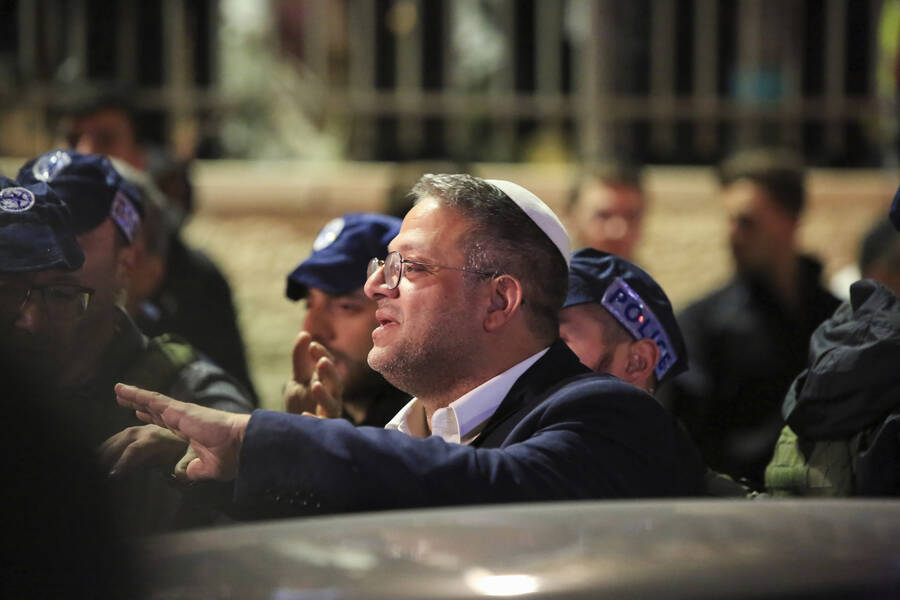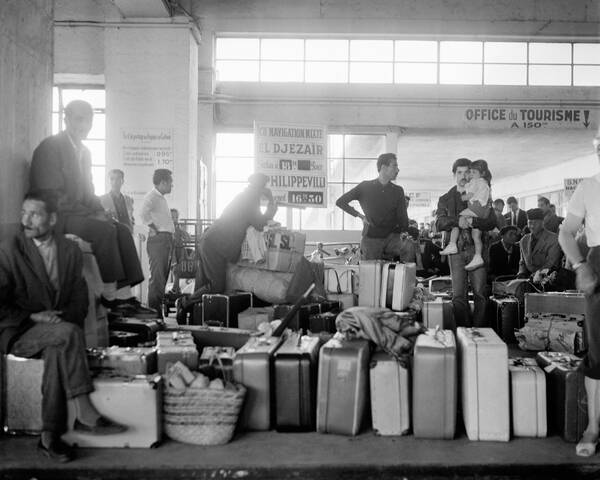Israeli Right Plans to Erode Palestinians’ Residency Rights
The right-wing security cabinet announced intentions to revoke fundamental benefits from families of those convicted of terrorism.

Israeli National Security Minister Itamar Ben-Gvir visits the scene where a Palestinian man from East Jerusalem shot seven people in a Jewish settlement.
(This article previously appeared in the Jewish Currents email newsletter; subscribe here!)
On January 29th, the Israeli security cabinet met to discuss what to do about escalating violence. The previous Thursday, an army raid in the Palestinian city of Jenin had left nine Palestinians dead, and the weekend had brought the bloodiest attacks on Israeli civilians since 2011, in attacks by two separate East Jerusalem gunmen, with one of them, in the Neve Yaakov neighborhood, killing seven.
After the meeting, the cabinet, which includes Israel’s top politicians—Prime Minister Benjamin Netanyahu, National Security Minister Itamar Ben Gvir, Finance Minister Betzalel Smotrich, and Justice Minister Yariv Levin—published a short list of its plans to “extract a price from terrorists and their supporters.” In addition to promises to seal and demolish the Neve Yaakov assailant’s house (sealing ensures that the family cannot enter the home or collect their possessions before demolition), boost the Israeli army and police forces’ capabilities to carry out mass arrests, and make it easier for Israeli civilians to acquire gun licenses, the cabinet put forth an unprecedented proposal: a pledge to revoke certain fundamentals of Israeli citizenship or residency rights, like national insurance benefits and Israeli ID cards, from the family members of those convicted of terrorism. On Twitter, Smotrich wrote, “If the terrorist’s entire family were deported to Gaza without an identity card and without social rights . . . no one would be proud of the terrorist and what he did to his family.”
“It makes Israel’s national insurance, which is meant to be a welfare agency, into an arm of the security force,” said Jessica Montell, the CEO of the Israeli human rights group HaMoked: The Center for the Defense of the Individual. “This is a huge expansion of collective punishment.” Because the recent violence against Jewish Israeli civilians was perpetrated by East Jerusalem Palestinians, families there are likely the primary targets for the cabinet’s new plans. Montell said that the government’s plans indicate the extent to which the current far-right Israeli government sees Palestinians who live in Israel and East Jerusalem not as members of a shared polity but rather as provisional citizens or temporary residents.
When Israel annexed East Jerusalem in 1967, it gave Palestinians living there residency rights, which include the basic package of rights that all citizens receive—medical insurance, allowances for children, unemployment benefits, and physical and mental disability benefits—but exclude the right to vote in national elections. “It’s a welfare package of financial support to ensure standards of living,” said Abeer Baker, a Palestinian attorney whose clients include a number of Palestinians in Israeli prisons. “[Stripping this] will mean no security in anything.” (The Knesset is currently fast-tracking the review of a separate bill in committee, introduced on January 30th, aimed at revoking citizenship from and then deporting “security prisoners” who have taken money from the PA while incarcerated.)
Attempts to revoke Palestinians’ residency status will likely bring the government into conflict with Israel’s High Court of Justice, as similar plans have in the past. In 2008, the Knesset passed a law to allow Israel’s Interior Minister to revoke citizenship or residency on the basis of “breach of allegiance to the state.” The law was invoked in 2017 against two Palestinian citizens of Israel serving prison sentences. Israel has never used these measures against Israeli Jewish perpetrators: In fact, in 1996, the Supreme Court rejected a petition to revoke the citizenship of Yigal Amir, who assassinated Prime Minister Yitzchak Rabin, on the grounds that the revocation of citizenship was essentially barbaric. It said then that a civilized society should make its disapproval clear in other ways.
“Why didn’t they take [the citizenship of] Amir?” Mohamad Abu Hummus, an East Jerusalem resident and former “security prisoner” in Israeli jail, asked me. “Why didn’t they take Baruch Goldstein who murdered Palestiains in Hebron? Why didn’t they take the guy who murdered Mohammed Abu Khader [a young East Jerusalem boy who was brutally murdered in 2014] Why. This is just racism.”
In response to the state’s attempt to use the law in 2017, The Association for Civil Rights and Israel; Adalah: The Center for Minority Rights in Israel; and HaMoked challenged it in court. In July of last year, the High Court came down with a decision that simultaneously upheld and defanged the law. It ruled that the state may declare a person’s citizenship revoked, but cannot leave them without “status.” In other words, should the Interior Ministry revoke citizenship, it would be required by law to grant residency instead. The subject would lose his or her right to vote and call themselves a citizen, but retain social benefits. If the security cabinet pushes ahead with its plan, Montell of HaMoked said she and other civil society NGOs would again petition the High Court. Their case, however, will be brought amid proposed “judicial reforms” to gut the power of the Supreme Court. “It’s a whole new world in terms of the ability to advocate on these issues. Of course the court would say that those measures are illegitimate,” she said, but it’s an open question “whether or not they are going to continue to have the authority to strike down unconstitutional laws.”
So far, the cabinet has carried out some of its responsive measures swiftly. The attack in Neve Yaakov took place on a Friday night—January 29th—and by the end of Saturday, 42 people had been arrested, many of them relatives or acquaintances of the perpetrator, a 21-year-old named Khairy Al-Qam. Early Sunday morning, Khayri’s home was sealed—a video shows soldiers welding shut the doors and windows—and slated for demolition. His family had no time to object or appeal to the High Court, as is their right by law. In the next three days, Israel demolished ten buildings in East Jerusalem belonging to Palestinians not involved in the attack. Ir Amim, an NGO that promotes the rights of East Jerusalem Palestinians, said in a statement that “given the timing, this seeming demolition spree is a retaliatory and vindictive move directed at the entire Palestinian collective in East Jerusalem.” That Sunday, the government also voted to seal the home of the other assailant in East Jerusalem, a 13-year old boy who had wounded two. Previously, Israel only sealed the homes of those whose actions resulted in fatalities.
As for the proposal to revoke residency rights from families, it’s unclear yet whether the government will take action to put it into practice. “Up until now, we could have known to categorize [these kinds of proposals] as populist rhetoric pandering to extremists,” said Montell. “But with this government you don’t know what is empty rhetoric and what is an actual plan.”
Elisheva Goldberg is the media and policy director for the New Israel Fund and a contributing writer for Jewish Currents. She was an aide to former Israeli Foreign Minister Tzipi Livni and has written for The Daily Beast, The Forward, The New Republic, and The Atlantic.

